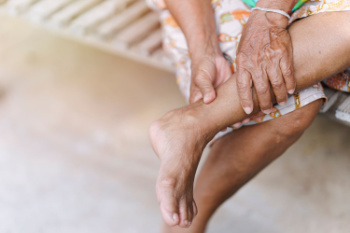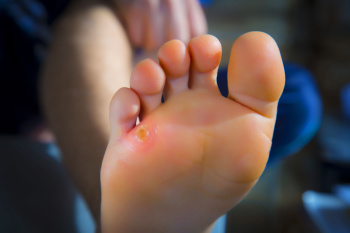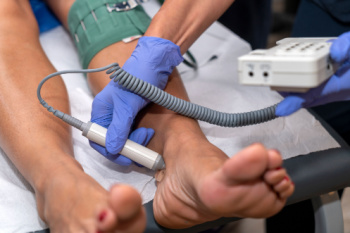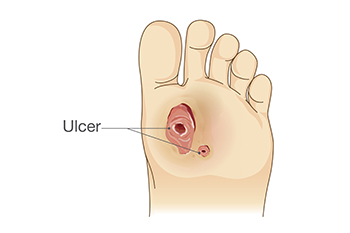Items filtered by date: February 2024
Geriatrics and Podiatry
Bone density loss, dry skin, poor circulation, and rough and brittle nails are some of the common problems that can occur as people age. The effect that these problems has on foot health should be of particular concern in comprehensive geriatric care.
Feet that are diseased or injured have a negative effect on overall health and safety. Painful feet limit a person’s willingness and ability to stay active. Poor foot health can also cause gait change, which can lead to falls and accidents. Even though recovery time from health problems naturally slows as we age, many foot problems can be avoided altogether with regular prophylactic care.
Feet should be thoroughly washed in warm water daily. Care must be taken to dry the feet well, making sure to dry between and under the toes. Any left-over moisture can cause problems like foot fungus. After cleaning feet carefully check for problems such as cracked skin, bruises, swelling, cuts, corns, or other irregularities.
Examine toenails for ingrown, jagged, or split nails. Long toenails should be cut straight across. Never cut toenails at an angle or down the side as this may lead to ingrown nails.
Cracked and dry feet should be treated once or twice a day with a non-greasy moisturizer. Rub the moisturizer into the skin and allow it to dry before putting on socks and shoes. Sweaty feet can be dusted with a small amount of talcum powder. Avoid putting talcum directly into shoes as this may make feet slip within the shoe and cause a serious fall.
Wear clean dry socks each day. Not only do clean socks feel better on the feet, but socks worn for longer periods may harbor disease and odor-causing bacteria. Socks should not be tight around the top as they can leave marks on the leg. Socks that are too small can bring about bruising caused by pressure against the toes.
Wear comfortable and well-fitting shoes. If possible, consult a professional footwear specialist when purchasing shoes. Do not walk around barefoot as this exposes the feet to possible injury and bacteria.
Good foot health allows a more active lifestyle, which improves blood flow. Good circulation aids in recovery from injury or illness. It is also important for maintaining overall health.
Serious health problems can manifest themselves as symptoms in the feet. The elderly should seek professional help from a podiatrist if experiencing foot problems like tingling, numbness, pain, infection, or a sore that does not heal. Taking care of these problems right away can prevent the development of severe cases.
Why Regular Foot Check-Ups Are Important for Older Adults
 Regular foot check-ups are important for older adults to help identify potential problems early on. Getting treatment for any issues also prevents these problems from escalating into more serious conditions. As people age, changes in foot structure, skin integrity, and circulation can occur, making the feet more susceptible to various issues, such as pain and cracked heels. Regular check-ups become especially important for those with chronic conditions like diabetes or arthritis, as these can significantly impact foot health. Certain conditions, like plantar fasciitis and osteoarthritis, become more likely with repetitive movement and the natural wear and tear that comes with aging. Podiatrists can assess the risk of developing complications, provide personalized advice on footwear, and offer guidance on preventive measures. If you have concerns about your foot health as an older adult, or if you are experiencing foot pain, it is suggested that you schedule an appointment with a podiatrist.
Regular foot check-ups are important for older adults to help identify potential problems early on. Getting treatment for any issues also prevents these problems from escalating into more serious conditions. As people age, changes in foot structure, skin integrity, and circulation can occur, making the feet more susceptible to various issues, such as pain and cracked heels. Regular check-ups become especially important for those with chronic conditions like diabetes or arthritis, as these can significantly impact foot health. Certain conditions, like plantar fasciitis and osteoarthritis, become more likely with repetitive movement and the natural wear and tear that comes with aging. Podiatrists can assess the risk of developing complications, provide personalized advice on footwear, and offer guidance on preventive measures. If you have concerns about your foot health as an older adult, or if you are experiencing foot pain, it is suggested that you schedule an appointment with a podiatrist.
If you need your feet checked, contact Stanley Luksenburg, DPM of Home Foot Care. Our doctor will attend to all of your foot and ankle needs and provide you with quality treatment.
Geriatrics and Podiatry
When people age, some common issues that may occur are bone density loss, dry skin, poor circulation, and rough brittle nails. These issues may also affect your foot health if the necessary steps are not taken to alleviate the problems.
It is important to take care of your feet because feet that are injured or diseased can affect your overall health. Having painful feet hinders your ability to do daily activities or may decrease your willingness to do the things that you need to do.
Visiting Your Geriatrician
As we age, health problems become more likely, so it is essential to visit your doctor for check-ups to ensure that you are doing the best you can to take care of your health. It is recommended to check your feet frequently for any possible cuts, bruises, swelling, corns or any other irregularities.
Taking Care of Elderly Feet
Cracked or dry feet can be treated by applying moisturizer often. It is also important not to wear old socks because the older the sock is, the higher the possibility there will be that there is bacteria there. Wear fresh socks and make sure they fit properly.
Proper foot health means that you can have a more active lifestyle and you will not be bogged down by pain. Foot health also leads to good circulation, which is paramount for overall health.
If you have any questions, please feel free to contact our office located in Fairway Park, OH . We offer the newest diagnostic tools and technology to treat your foot and ankle needs.
Corns: What Are They, and How Do You Get Rid of Them
Corns are thickened areas on the skin’s surface, to the point of being irritating and sometimes painful. Commonly found on the feet, corns are circular or cone-shaped. They develop where there are areas of pressure or friction, such as on the little toe when it rubs up against shoes, or on the ball of your foot.
Corns are often confused with a callus, but there is a difference between them. Corns can be raised bumps that are painful to the touch. They consist of a rough, thick area of skin that may be dry or waxy. Corns tend to be surrounded by skin that is inflamed, and are usually much smaller than calluses.
Removing the dead skin that has built up is the key in treating corns. Salicylic acid medication is most common in accomplishing this. The acid works by dissolving keratin, which is the protein that makes up the majority of corns. You can purchase salicylic acid over-the-counter in products such as wart removers. It comes in a variety of forms such as medicated pads, drops, or creams. However, people who are diabetic should not use salicylic acid, but should instead consult their doctor immediately.
According to the product directions, applying the medication directly onto the corn will treat it. The top layer of the corn will begin to turn white after use. When that occurs, the layers of skin can then be peeled away, making the corn smaller. Shaving off corns with razors or other pedicure equipment is never a good idea. This can lead to infection. If your corn gets infected, and is not treated immediately, a visit to the doctor will be necessary.
Another way to treat corns and help prevent their return is by using orthotic inserts, fitted by a podiatrist. Inserts fit right into your shoes and adjusts the way your foot fits into your shoes. This fixes the way you walk. This will lower your chances of getting corns, and eliminate current corns by reducing rubbing from friction.
Surgery is rarely used to treat corns, but does occur on occasion. Surgery actually deals with the underlying issue that causes corns. During surgery, the bone is shaved and any abnormalities are corrected, thus reducing the amount of friction that occurs during walking.
To prevent corns, the first step is reducing friction. Always wear shoes that fit well and don’t rub your feet. Pads can be purchased if you notice rubbing developing. These pads can be purchased over-the-counter, and can be simply placed on the irritated area. Wearing cushioned insoles in your shoes can always reduce the friction, and making sure to wear well-fitting shoes. This will ensure that your foot is not being squeezed awkwardly, and prevent corns from forming in the first place.
Why Foot Corns Develop in Certain Spots
 Corns can develop on many parts of the feet, although certain areas are more prone to corn formation due to increased pressure, friction, or rubbing against footwear. One common location for corns is on the tops of the toes, particularly over joints where the toe bones meet. The pressure from shoes that are too tight or narrow can cause friction in these areas. Similarly, corns may form on the sides of the toes, where adjacent toes rub against each other or against the sides of shoes. On the soles of the feet, corns often occur over bony prominences, such as the balls of the feet or the heels. Excessive pressure from walking or standing can cause thickened areas of skin to develop. Soft corns can also form between the toes due to moisture accumulation and friction. If you have corns on your feet, it is suggested you consult with a podiatrist who can provide more information about effective treatment and prevention.
Corns can develop on many parts of the feet, although certain areas are more prone to corn formation due to increased pressure, friction, or rubbing against footwear. One common location for corns is on the tops of the toes, particularly over joints where the toe bones meet. The pressure from shoes that are too tight or narrow can cause friction in these areas. Similarly, corns may form on the sides of the toes, where adjacent toes rub against each other or against the sides of shoes. On the soles of the feet, corns often occur over bony prominences, such as the balls of the feet or the heels. Excessive pressure from walking or standing can cause thickened areas of skin to develop. Soft corns can also form between the toes due to moisture accumulation and friction. If you have corns on your feet, it is suggested you consult with a podiatrist who can provide more information about effective treatment and prevention.
If you have any concerns regarding your feet and ankles, contact Stanley Luksenburg, DPM of Home Foot Care. Our doctor will treat your foot and ankle needs.
Corns: What Are They? and How Do You Get Rid of Them?
Corns can be described as areas of the skin that have thickened to the point of becoming painful or irritating. They are often layers and layers of the skin that have become dry and rough, and are normally smaller than calluses.
Ways to Prevent Corns
There are many ways to get rid of painful corns such as wearing:
- Well-fitting socks
- Comfortable shoes that are not tight around your foot
- Shoes that offer support
Treating Corns
Treatment of corns involves removing the dead skin that has built up in the specific area of the foot. Consult with Our doctor to determine the best treatment option for your case of corns.
If you have any questions please feel free to contact our office located in Fairway Park, OH . We offer the newest diagnostic and treatment technologies for all your foot and ankle needs.
Do You Suffer From Painful Feet?
Elderly and their Feet
While proper foot care is important for everybody, senior citizens have the tendency to be more susceptible to certain foot conditions. The elderly should therefore be well informed about any problems that may arise and about what they can do to properly avoid or treat them.
Some of the most common foot problems seniors are susceptible to include foot ulcers, ingrown toenails, fallen arches, and fungal nails. A foot ulcer is an open sore on the foot and can be a result of diabetes and decreased sensation in the feet. An ingrown toenail is defined as when the nail grows into the side of the toe. Fallen arches are indicated by the instep of the foot collapsing. A fungal nails is a condition that results in deformed and discolored toenails.
In order to avoid these conditions it is recommended that the feet be inspected by the patient on a regular basis. If these inspections are carried out routinely, there is a good likelihood that problems can be identified before they become severe, or can even be avoided altogether. If any abnormality is discovered, it is important that the individual consult a podiatrist for diagnosis and information on treatment options.
Proper foot hygiene is also important. Making sure that you always have clean, dry socks on can be a major deterrent to many different problems including bacterial infections, foot odor, and certain types of fungus. Wet feet are a major cause of many of these problems. If your socks get wet, it is important to change them. Walking around in wet socks may not only lead to various infections, but can irritate the skin and result in a number of various complications. Clean, dry feet are less likely to be affected by fungal and other infections.
As people age, the fat present on your feet begins to deteriorate. The protective nature of this fat keeps the feet healthy by providing a barrier between your bones and the ground. This also aids in giving the skin on the feet a certain amount of elasticity. This is one factor that causes elderly people to develop some serious foot issues. Foot moisturizers can be helpful to avoid certain problems associated with this. However, water-based moisturizers do not work as well for elderly people as they do for the young. Instead, it is more effective to use an emollient instead. An emollient is effective because it binds the water in the foot, keeping it from becoming absorbed too readily which will result in dry skin. Emollients also have a special property called occlusion, which provides a layer of oil on the skin. This layer prevents the foot from drying up and can be very effective in treating dry skin disorders. If you can keep the skin on your feet healthy, this will substantially reduce the number of foot problems you will encounter in old age.
Proper footwear is another way to keep feet healthy. Shoes that fit well and provide proper support help prevent ingrown toenails and fallen arches.
Certain medical conditions such as diabetes or poor blood circulation increase the risk for foot issues. For individuals with any of these conditions it is extremely important to conduct regular foot inspections to make sure that there are no sores or infections present.
Vascular Foot Health Among the Elderly Population

Peripheral arterial disease, also known as PAD, is a condition that happens when your leg arteries become narrow due to a build-up of fat inside them. It can cause pain and weakness in your legs and feet when you walk, but the pain generally dissipates when you rest. Some older people with PAD do not feel any symptoms because they may have other health problems, or their symptoms are not the usual foot and leg pain. Doctors use simple tests to find out if you have PAD. They measure the blood pressure in your ankles and arms and compare them. If the ankle pressure is lower, it means you might have PAD. This condition is more common as people get older, and it is linked to things that can include smoking, diabetes, high blood pressure, and elevated cholesterol levels. If you have peripheral arterial disease and feel pain in your feet and legs, it is suggested that you schedule an appointment with a podiatrist who can perform a proper diagnosis, and guide you toward treatment that can help to improve blood flow.
Proper foot care is something many older adults forget to consider. If you have any concerns about your feet and ankles, contact Stanley Luksenburg, DPM from Home Foot Care. Our doctor can provide the care you need to keep you pain-free and on your feet.
The Elderly and Their Feet
As we age we start to notice many changes in our body, but the elder population may not notice them right away. Medical conditions may prevent the elderly to take notice of their foot health right away. Poor vision is a lead contributor to not taking action for the elderly.
Common Conditions
- Neuropathy – can reduce feeling in the feet and can hide many life-threatening medical conditions.
- Reduced flexibility – prevents the ability of proper toenail trimming, and foot cleaning. If left untreated, it may lead to further medical issues.
- Foot sores – amongst the older population can be serious before they are discovered. Some of the problematic conditions they may face are:
- Gouging toenails affecting nearby toe
- Shoes that don’t fit properly
- Pressure sores
- Loss of circulation in legs & feet
- Edema & swelling of feet and ankles
Susceptible Infections
Diabetes and poor circulation can cause general loss of sensitivity over the years, turning a simple cut into a serious issue.
If you have any questions please feel free to contact our office located in Fairway Park, OH . We offer the newest diagnostic and treatment technologies for all your foot and ankle needs.
Diabetic Foot Care
Diabetes affects millions of people every year. Blood vessels located all over the body are damaged due to diabetes—even the blood vessels of the feet. Neuropathy, or nerve damage, can result from slower blood flow in the legs and feet. In diabetic patients, neuropathy is very important to monitor, as diabetics are at risk for developing ulcers.
Always washing and thoroughly drying the feet are pertinent parts of diabetic foot care. There should be a focus on cleaning between the toes. Even if no pain is felt, the entire foot should be examined for redness and sores. Neuropathy can often mask the pain of sores and ulcers and can cause these conditions to be overlooked. Use a mirror to examine the underside of your feet if needed. It is recommended that diabetics wear well-fitting socks.
Patients with diabetes should have their doctor monitor their blood levels because blood sugar levels play a huge role in diabetic care. Monitoring these levels on a regular basis is highly advised. It is very important to keep your blood sugar levels in the normal range, which can be determined by your physician. There are medications that may be prescribed to help with any neuropathy experienced by the diabetic patient. It is also advisable to visit a podiatrist if one is experiencing any conditions involving the feet, such as ingrown toenails, which in more severe cases can cause infection.
Diabetic feet must be inspected daily. Diabetic foot care at home is possible if a patient is provided with instructions from their podiatrist. Patients can relieve dry heels with creams or ointments. Suspected wounds should warrant an immediate call to the podiatrist. Gangrene is a serious problem for diabetics and can lead to sepsis and amputation in its worst cases. Early treatment and daily inspection of diabetic feet are keys to staying healthy.
How Podiatrists Manage Diabetic Feet
 Podiatrists play a vital role in diabetic foot care, offering specialized assistance to prevent foot complications from developing. People with diabetes need to pay close attention to foot care, because high blood sugar can cause damage to nerves and result in poor blood circulation in the feet. When people cannot feel pain in their feet, they may not notice problems such as cuts and ulcers. Wounds are at even higher risk for infection as a result of poor blood flow. Podiatrists help by conducting regular foot exams to identify any issues early on. They also perform neurovascular and musculoskeletal assessments for the feet. Podiatrists educate their patients about proper foot hygiene, nail care, and daily foot checks, as well as recommend suitable footwear to prevent problems. If a patient has foot issues such as calluses, corns, or ingrown toenails, this type of doctor can treat them to prevent the issues from worsening. If you have diabetes and suspect foot problems, it is suggested you consult a podiatrist who can help you manage and prevent foot-related complications due to having diabetes.
Podiatrists play a vital role in diabetic foot care, offering specialized assistance to prevent foot complications from developing. People with diabetes need to pay close attention to foot care, because high blood sugar can cause damage to nerves and result in poor blood circulation in the feet. When people cannot feel pain in their feet, they may not notice problems such as cuts and ulcers. Wounds are at even higher risk for infection as a result of poor blood flow. Podiatrists help by conducting regular foot exams to identify any issues early on. They also perform neurovascular and musculoskeletal assessments for the feet. Podiatrists educate their patients about proper foot hygiene, nail care, and daily foot checks, as well as recommend suitable footwear to prevent problems. If a patient has foot issues such as calluses, corns, or ingrown toenails, this type of doctor can treat them to prevent the issues from worsening. If you have diabetes and suspect foot problems, it is suggested you consult a podiatrist who can help you manage and prevent foot-related complications due to having diabetes.
Diabetic foot care is important in preventing foot ailments such as ulcers. If you are suffering from diabetes or have any other concerns about your feet, contact Stanley Luksenburg, DPM from Home Foot Care. Our doctor can provide the care you need to keep you pain-free and on your feet.
Diabetic Foot Care
Diabetes affects millions of people every year. The condition can damage blood vessels in many parts of the body, especially the feet. Because of this, taking care of your feet is essential if you have diabetes, and having a podiatrist help monitor your foot health is highly recommended.
The Importance of Caring for Your Feet
- Routinely inspect your feet for bruises or sores.
- Wear socks that fit your feet comfortably.
- Wear comfortable shoes that provide adequate support.
Patients with diabetes should have their doctor monitor their blood levels, as blood sugar levels play such a huge role in diabetic care. Monitoring these levels on a regular basis is highly advised.
It is always best to inform your healthcare professional of any concerns you may have regarding your feet, especially for diabetic patients. Early treatment and routine foot examinations are keys to maintaining proper health, especially because severe complications can arise if proper treatment is not applied.
If you have any questions please feel free to contact our office located in Fairway Park, OH . We offer the newest diagnostic and treatment technologies for all your foot and ankle needs.
